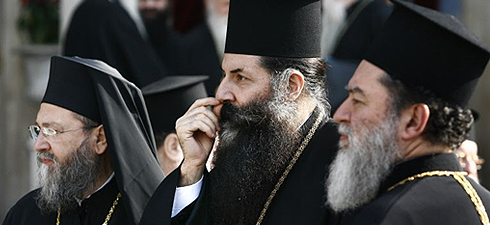In the wake of the socialist government's attempts to impose a one-off tax of approximately 600,000 euros on CoG property, relations between the CoG and the state—two institutions that are not separated—have reached a new low, with the CoG simply refusing to pay. "The Church of Greece contributes to the state when it works. There is no reason for any other contribution," announced Bishop Theoklitos of Ioannina [in the northwest of the country]. The Bishop who chairs the CoG's financial affairs committee insists that "the tax would encumber some members of the the clergy with excessive debt." He sees no reason for the tax, "because there is no war or disaster that requires our contribution. Instead, we are being called on to contribute because of failed economic policies. We refuse to foot the bill for other people's mistakes!"
Theoklitos also pointed out that in the past, "the state has already seized CoG assets on several occasions"—most recently in 1952, when a contract stipulating the obligations of both parties, which is still in force, was signed between the two institutions. As it stands, the latest estimates from the Bank of Greece, evaluate the CoG's property portfolio—which represents just four percent of the holdings it had 60 years ago—at over 700 million euros, and its share portfolio at nine million euros.
In Greece, priests are public servants
Today, the state is once again attempting to tax the clergy with divisive results. The CoG is not refusing to pay taxes, but insisting that taxes be established on cultivated or serviceable land. The government's decree "is a request for charity, but our institution is not simply a charity," explained Theoklitos. The clergy also believe that the initiative is unfair, because it fails to take into account the fact that "the Church operates 800 establishments for the needy."
The battle lines have been drawn: the CoG will not provide charity for the state, and this is the underlying reason for its refusal to pay the one-off tax. But it may not be enough to fend off a further attack from the government, which is having difficulty making ends meet. The Minister of Finance has described the situation of the country, where the public spending deficit has reached 12% of GDP, as "critical." The CoG is still Greece's largest property owner, and as such, it will remain in the frontline. Like his predecessor Costas Simitis—who overcame opposition from the clergy in 1999 when mention of religious beliefs was removed from Greek identity cards—socialist Prime Minister, Georges Papandréou, is determined not to shy away from conflict with the CoG.
Perhaps it would be preferable to "separate the church from the state," said Bishop Theoklitos. "We might not have as many priests, but we would have priests and not public service employees [the clergy of the CoG are paid by the state]. But we should not be forced to take all the blame for the fact that politics have been forced on to the pulpit," he concluded. However, a definitive separation between the CoG and the state is not likely to happen anytime soon, and until then, the debate will remain ongoing.
Was this article useful? If so we are delighted!
It is freely available because we believe that the right to free and independent information is essential for democracy. But this right is not guaranteed forever, and independence comes at a cost. We need your support in order to continue publishing independent, multilingual news for all Europeans.
Discover our subscription offers and their exclusive benefits and become a member of our community now!












